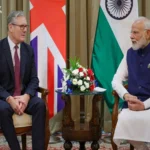The desire of India to become a world position usually supported by the West as a factor to counterbalance China has hit the reality of the bitter internal contradictions and external defeats. In spite of lauding India as an emerging democracy in the Indo-Pacific region, it is missing those pre-requisite attributes necessary to assume the role of a responsible and credible international power. Rather, the country in the hands of Narendra Modi and his Hindu nationalistic program has moved towards fascist type of rule, weakening the democratic structures of the country and its ethical standing across the global arena. In his article in foreign affairs, the well-known scholar Ashley Tellis clearly strips the myth of impending superpowers of India by pointing out how the structural weaknesses, autocratic inclinations and the amount of arrogance, a country like India is not capable of attaining the superpower status it seeks.
The comparison of India with China is somehow one of the major illusions that are perpetrated in India. The reality on the ground, however, is somewhat different as conveyed by hard figures, whereas Indian politicians and the media continue to beat the theme of emerging India as the counter to the Chinese. The Chinese economy grew by an average of 9 per cent in more than 30 years, taking millions of Chinese out of poverty and build up an impressive industrial and technological foundation. However, on the contrary, India finds it difficult to achieve even a 6-percent growth rate annually, even in favourable world conditions.
It is not a matter of percents, moreover, it is a matter of complete development models, China boasts of disciplined, professional work force as well as a well built infrastructure whereas India battles with rampant poverty, unemployment and destruction of its infrastructure. India with the size of population of over one billion people can be considered huge on paper, yet a large part of the population is unskilled, ill educated and poor. Countries do not grow out of their backs of figures; they grow out of their human capital, innovation and government.
The most crucial failing, however, to which India can be disqualified as a potential great power is not on the economic or military front but on the political front of its path. India has been experiencing a quick loss of democratic norms under the governance of Prime Minister Modi and the ideology of Rashtriya Swayamsevak Sangh (RSS). The secular cloth envisaged by its fathers mainly Jawaharlal Nehru has been substituted by the virulent majoritarianism of Hindutva. Bodies that were traditionally referred to as strongholds of democracy, judiciary, Press, civil services have been either compromised or coerced to submission.
The persistence with which the government deals with dissenters, the detention of journalists without cause, the silencing of Muslims and frustrating the rights of minority groups, are precise signs of pushback in democracy. A country with a strong tendency to intuitive pluralism and repression against civil liberties cannot be a model of democracy, or the world leader instead.
India is another power that is delusional of its military capability. Many times, its performance on the battlefield has not been very good despite its huge defence budget and large standing army. This was a painful reminder as seen in the May 2025 war against Pakistan. Having not triumphed in proving its superiority, India not only strategically and reputationally lost to a smaller but much less disintegrated opponent but it also lost the option of claiming it actually won the battle. Its bully tactics of smaller neighbours have also have largely miscarried resulting into their becoming closer to China or causing suspicion amongst neighbours. It is not the hostility but regional stability that is given by a legitimate great power.
India has experienced not only the domestication of disparate fragments but also the deterioration of relations with Muslim-dominated neighbours because of their ideological shift towards Hindu nationalism. India has always had a problematic relationship with Pakistan and lately with Bangladesh too because of the fear of anti-Muslim activities. Maldives and others also frequently got engaged in a tussle with India. Instead of acting as a unification factor in South Asia, expansionist rhetoric and Hindutva policy of India is destabilizing the region and India cannot be trusted towards cross regional collaboration.
Another aspect that denies India the status of great powers is its diplomatic conduct. Although it tries to put all the sides-while trying to court the United States and keep United States tied to Russia and pursuing trade with China, it has not been able to cut any principled or strategic identity in the world diplomacy. Its neutral position in the war between Russia and Ukraine angered the European capitals as well as Washington. Its unwillingness to assume clear standpoints particularly on pressing global concerns has revealed an unscrupulous foreign policy that is based on opportunism as opposed to leadership. Furthermore, the insulting nature of the Indian leaders towards international standards and the increasing level of arrogance on their part in dealing with other countries has also lost them the goodwill of major players in the world arena.
The worst perhaps, is the fact that India finds itself on the side of authoritative states in matters related to conflicts in the world. Its adoption of an aggressive policy towards Israel in recent years, in support of the Israeli military campaign in Gaza and in silence on the aspect of western pressure on Iran, portends an alarming adoption of right-wing militarism. The issue here is not that of a moral power, but of a state ready to trade justice and legality on the altar of political expediency. The role played by the Modi regime in indirectly condoning or being complicit to violence both internally or externally, only reinforces the perception of India being a retrogressive, rather than progressive player in international relations.
The fact is that India is not only trying to be a global power too soon, but also by attempting the act fundamentally failed. Its projected image is completely at odds with the internal facts of economic lassitude, decline in democracy as well as social disintegration. Instead of coming out as a worthy opponent of Chinese leadership with a responsible role to play, India is drowning into the mud of fascism and dictatorship. Unless it changes its approach towards politics, rejuvenates democracy, engages more seriously in human development and operates on the global platform with a sense of moral authority India will always be a regional power that dreams, but never realizes.








